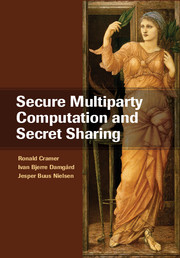Book contents
- Frontmatter
- Contents
- Preface
- Part I Secure Multiparty Computation
- 1 Introduction
- 2 Preliminaries
- 3 MPC Protocols with Passive Security
- 4 Models
- 5 Information-Theoretic Robust MPC Protocols
- 6 MPC from General Linear Secret-Sharing Schemes
- 7 Cryptographic MPC Protocols
- 8 Some Techniques for Efficiency Improvements
- 9 Applications of MPC
- Part II Secret Sharing
- List of Algorithms
- List of Exercises
- References
- Index
9 - Applications of MPC
from Part I - Secure Multiparty Computation
Published online by Cambridge University Press: 05 August 2015
- Frontmatter
- Contents
- Preface
- Part I Secure Multiparty Computation
- 1 Introduction
- 2 Preliminaries
- 3 MPC Protocols with Passive Security
- 4 Models
- 5 Information-Theoretic Robust MPC Protocols
- 6 MPC from General Linear Secret-Sharing Schemes
- 7 Cryptographic MPC Protocols
- 8 Some Techniques for Efficiency Improvements
- 9 Applications of MPC
- Part II Secret Sharing
- List of Algorithms
- List of Exercises
- References
- Index
Summary
In this chapter we will look at two different applications of information-theoretic multiparty computation (MPC), a practical application and a theoretical application. The example of a practical application is the use of MPC to clear a commodity derivative market. The focus will be on the algorithmic tricks used to implement the auction efficiently. The theoretical application is the use of MPC to realize so-called zero-knowledge proofs. A zero-knowledge proof is a way for a prover to convince a verifier about the validity of a statement without leaking any information on why the statement is true. This can be seen as an MPC problem with n = 2 parties. However, since the minimal requirement for information-theoretic MPC is that fewer than n/2 parties are corrupted, information-theoretic MPC does not seem to help in constructing zero-knowledge proofs. However, as we shall see, a technique sometimes called MPC in the head can be used to turn an efficient, secure MPC for a given relation into an efficient zero-knowledge proof for the same relation.
A Double Auction
In this section we look at a concrete application of MPC, with a main focus on the algorithmic tricks needed to efficiently do a secure auction. Along the way, we will look at how to efficiently and securely compare two integers secret shared among the parties.
9.1.1 Introduction
The algorithmic techniques we will look at are fairly general, but it is instructive to view them in a practical context. We will look at how they have been used to clear the Danish market for contracts on sugar beets from 2008 and until the time of this writing. This was the first industrial application of MPC. More historical details on this can be found later and in the Notes section at the end of this chapter.
In the economic field of mechanism design, the concept of a trusted third party has been a central assumption since the 1970s. The field has grown in momentum since it was initiated and has turned into a truly cross-disciplinary field. Today, many practical mechanisms require a trusted third party.
- Type
- Chapter
- Information
- Secure Multiparty Computation and Secret Sharing , pp. 182 - 200Publisher: Cambridge University PressPrint publication year: 2015



